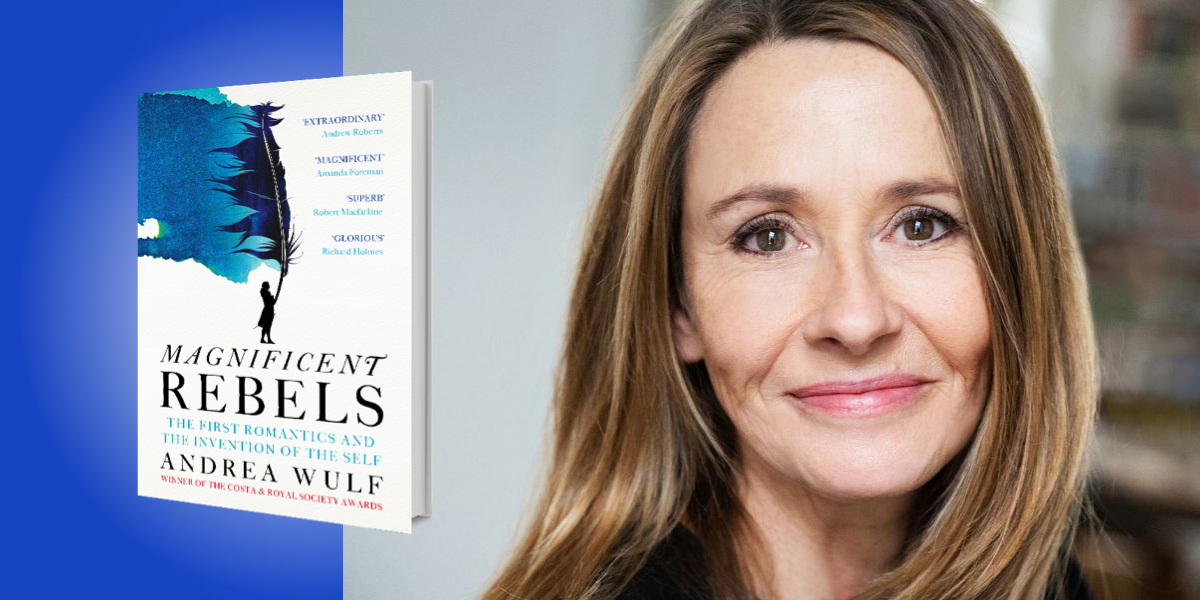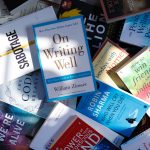Andrea Wulf is the author of Founding Gardeners, Brother Gardeners, and the New York Times best-seller The Invention of Nature, which has been published in twenty-seven languages and won fifteen international literary awards. Wulf has written for many newspapers and magazines, including the New York Times, The Guardian, the Los Angeles Times, The Wall Street Journal, and The Atlantic. She is a member of PEN America and a fellow of the Royal Society of Literature.
Below, Andrea shares 5 key insights from her new book, Magnificent Rebels: The First Romantics and the Invention of the Self. Listen to the audio version—read by Andrea herself—in the Next Big Idea App.
1. History can illuminate the present.
History is not a pile of old dusty ideas, but can shed light on what’s going on today. In my previous book The Invention of Nature—which is about Alexander von Humboldt, a German scientist who predicted harmful human-induced climate change—I looked at the relationship between humankind and nature in order to understand why we’ve destroyed so much of our beautiful planet.
But I also realized that it is not enough to just look at the connections between us and nature—we must also look at society. Currently, we live in a society obsessed with the self. After all, there is an entire generation called the “Me” generation. Self-fulfillment seems to have become our aspirational mantra. When did we begin to be as selfish as we are today? The first step to determining this is asking how we came to look at ourselves as individuals. More specifically, at what point did we expect to have the right to determine our own lives? When did we first ask the question, how can I be free? And I found the answers in Jena, Germany in the late 18th century.
2. Philosophers and poets can be very effective revolutionaries.
Revolutions don’t have to be fought with weapons, and they don’t have to involve bloodshed—words and ideas can just be as powerful. While thousands of French heads rolled off the guillotines during the French Revolution, something completely different happened in Jena, Germany. The French revolutionaries might have changed the political landscape of Europe, but it was this brilliant group of philosophers, literary critics, and poets in Jena who incited a revolution of the mind that we can still feel today.
“The only certainty was that the world was experienced by the self.”
Philosophy doesn’t have to be incomprehensible and abstract—quite the opposite. Great philosophical ideas can change our world in a very tangible way. The Jena Set tried to understand how we make sense of the world. Questions such as Who are we? What can we know? How can we know? and What is nature? were all questions that were approached through an investigation of the self.
They placed the self at the center stage of their thinking and changed the way we think about ourselves and the world. They explained that there were no God-given or absolute truths. The only certainty was that the world was experienced by the self. At a time when most of Europe was held in the iron fist of absolutism, they imbued the self with the most thrilling of all powers: free will and self-determination.
Today, few outside Germany have heard of Jena, but what happened there in those few years remains with us. We still think with the minds of these visionary thinkers, see with their imaginations, and feel with their emotions. We might not know it, but their way of understanding the world still frames our lives and being.
3. The magic of working together.
The friends in Jena worked, wrote, ate, and laughed together. They composed poems, drafted philosophical treatises, edited essays, and set up scientific experiments. They were exhilarated by this communal way of working and strived to create using a kind of intellectual symbiosis. They believed that two minds could belong together—and like divided halves, they could only reach their full potential when joined.
“They were exhilarated by this communal way of working and strived to create using a kind of intellectual symbiosis.”
There is something magical about seeing this group of famous thinkers and poets changing the world together. In Jena, their ideas collided and coalesced. And the impact was seismic, spreading out across the German states and on into the world—and into our minds. It is a reminder of the importance of sharing ideas, crossing disciplines, and having a big, open mind.
4. The importance of art.
Today, when we hear terms such as imagination, beauty, or aesthetics, we might think of art, culture, poems, painting, or music. But for the friends in Jena, these terms carried a deeply political and moral meaning. Let me unpack this a little more. They had all initially embraced the French Revolution, but as thousands were killed in Robespierre’s so-called “Reign of Terror,” many Germans became horrified by these bloody excesses.
The playwright Friedrich Schiller, who also lived in Jena, wondered if the French maybe had simply not been ready for freedom and equality. In order to be truly free, Schiller believed, one had to be morally mature. And with that, he didn’t mean “morality” like fidelity to a spouse or an individual’s sexuality—what he meant was the morality of a society that was ready to govern itself.
The Enlightenment, with its emphasis on reason, rationality, and empiricism, might have brought powerful knowledge, but all the knowledge in the world could not develop a person’s sense of right and wrong. The solution, the friends in Jena believed, was art. It was the bulwark against brutality, greed, and vice. “Art is a daughter of freedom,” Schiller said, and “it is through beauty that we reach freedom.” The Jena Set invested art and beauty with a political dimension.
“The Enlightenment, with its emphasis on reason, rationality, and empiricism, might have brought powerful knowledge, but all the knowledge in the world could not develop a person’s sense of right and wrong.”
For them, aesthetics, art, and beauty were not something pretty or decorative; they were essential to a better society. Today, as humanities departments are closing down in universities, as people ask for practical use and technological solutions, I think it’s a potent reminder of the importance of art. Art and philosophy make us better people.
5. Freedom and liberty come with responsibility.
At the heart of Magnificent Rebels is the tension between the breathtaking possibilities of free will and the pitfalls of selfishness. It’s a balancing act that continues to this day.
The Jena Set put the self at the nexus of their work and lives. The self, for better or worse, has remained at center stage ever since. But they never intended their ideas to be a narcissistic celebration of the self. They liberated the self with the intention of creating a better society—one that was founded on individuals who were no longer chained by monarchs and rulers to a predestined place and path, but individuals who were in control of their own destiny and identity.
The Jena Set believed that freedom is tightly interwoven with our moral obligations. Freedom gives us the choice as to how to act, and elevates us above base instincts such as greed, hunger, or fear. Freedom always brings along its twin: moral duty. The philosopher Johann Gottlieb Fichte told his students during his first lecture series in Jena in 1794 the following: “Only those are free, who will try to make everyone around them free.”
Freedom doesn’t mean that you can do whatever you want. Freedom means that you have a responsibility and a moral duty toward others. We’re still empowered by the Jena Set’s daring leap into the self. But we have to decide how to use their legacy.
To listen to the audio version read by author Andrea Wulf, download the Next Big Idea App today:

































